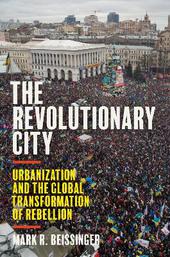
|
The Revolutionary City: Urbanization and the Global Transformation of Rebellion
Hardback
Main Details
| Title |
The Revolutionary City: Urbanization and the Global Transformation of Rebellion
|
| Authors and Contributors |
By (author) Mark R. Beissinger
|
| Physical Properties |
| Format:Hardback | | Pages:592 | | Dimensions(mm): Height 235,Width 156 |
|
| Category/Genre | Revolutions, uprisings and rebellions |
|---|
| ISBN/Barcode |
9780691224763
|
| Classifications | Dewey:307.76 |
|---|
| Audience | |
|---|
| Illustrations |
77 b/w illus. 14 tables.
|
|
Publishing Details |
| Publisher |
Princeton University Press
|
| Imprint |
Princeton University Press
|
| Publication Date |
12 April 2022 |
| Publication Country |
United States
|
Description
How and why cities have become the predominant sites for revolutionary upheavals in the contemporary world. Examining the changing character of revolution around the world, The Revolutionary City focuses on the impact that the concentration of people, power, and wealth in cities exercises on revolutionary processes and outcomes. Once predominantly an urban and armed affair, revolutions in the twentieth century migrated to the countryside, as revolutionaries searched for safety from government repression and discovered the peasantry as a revolutionary force. But at the end of the twentieth century, as urban centers grew, revolution returned to the city-accompanied by a new urban civic repertoire espousing the containment of predatory government and relying on visibility and the power of numbers rather than arms. Using original data on revolutionary episodes since 1900, public opinion surveys, and engaging examples from around the world, Mark Beissinger explores the causes and consequences of the urbanization of revolution in the late twentieth and early twenty-first centuries. Beissinger examines the compact nature of urban revolutions, as well as their rampant information problems and heightened uncertainty. He investigates the struggle for control over public space, why revolutionary contention has grown more pacified over time, and how revolutions involving the rapid assembly of hundreds of thousands in central urban spaces lead to diverse, ad hoc coalitions that have difficulty producing substantive change. The Revolutionary City provides a new understanding of how revolutions happen and what they might look like in the future.
Author Biography
Mark R. Beissinger is the Henry W. Putnam Professor of Politics at Princeton University. His books include Nationalist Mobilization and the Collapse of the Soviet State and Historical Legacies of Communism in Russia and Eastern Europe.
Reviews"The most important new book on revolutions to appear in decades."---Jack A. Goldstone, Mobilization
|